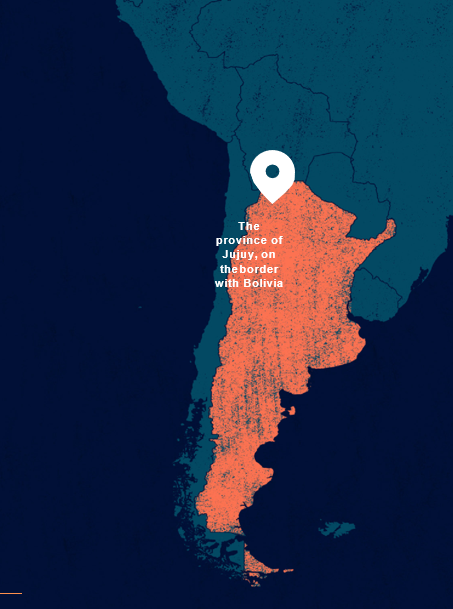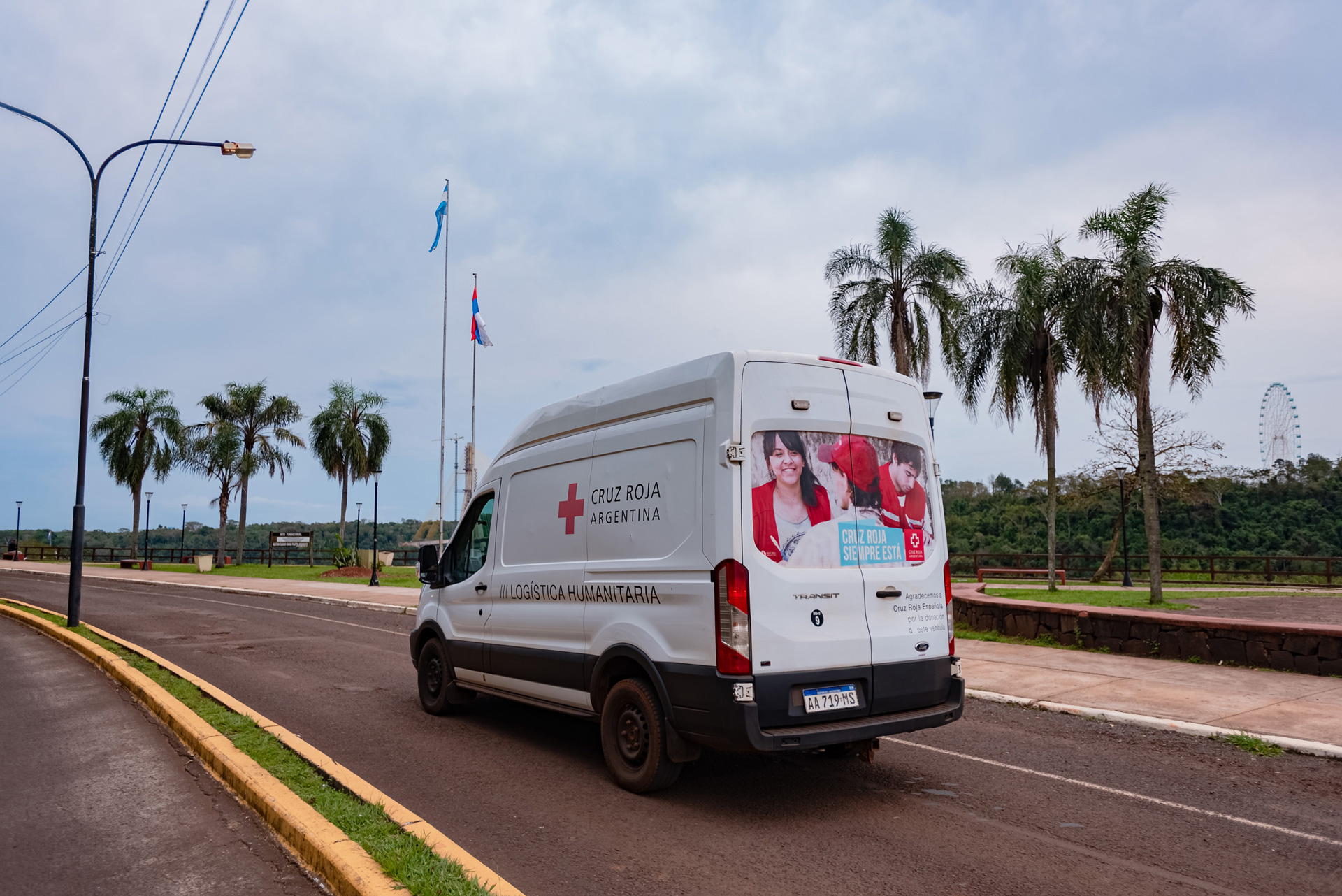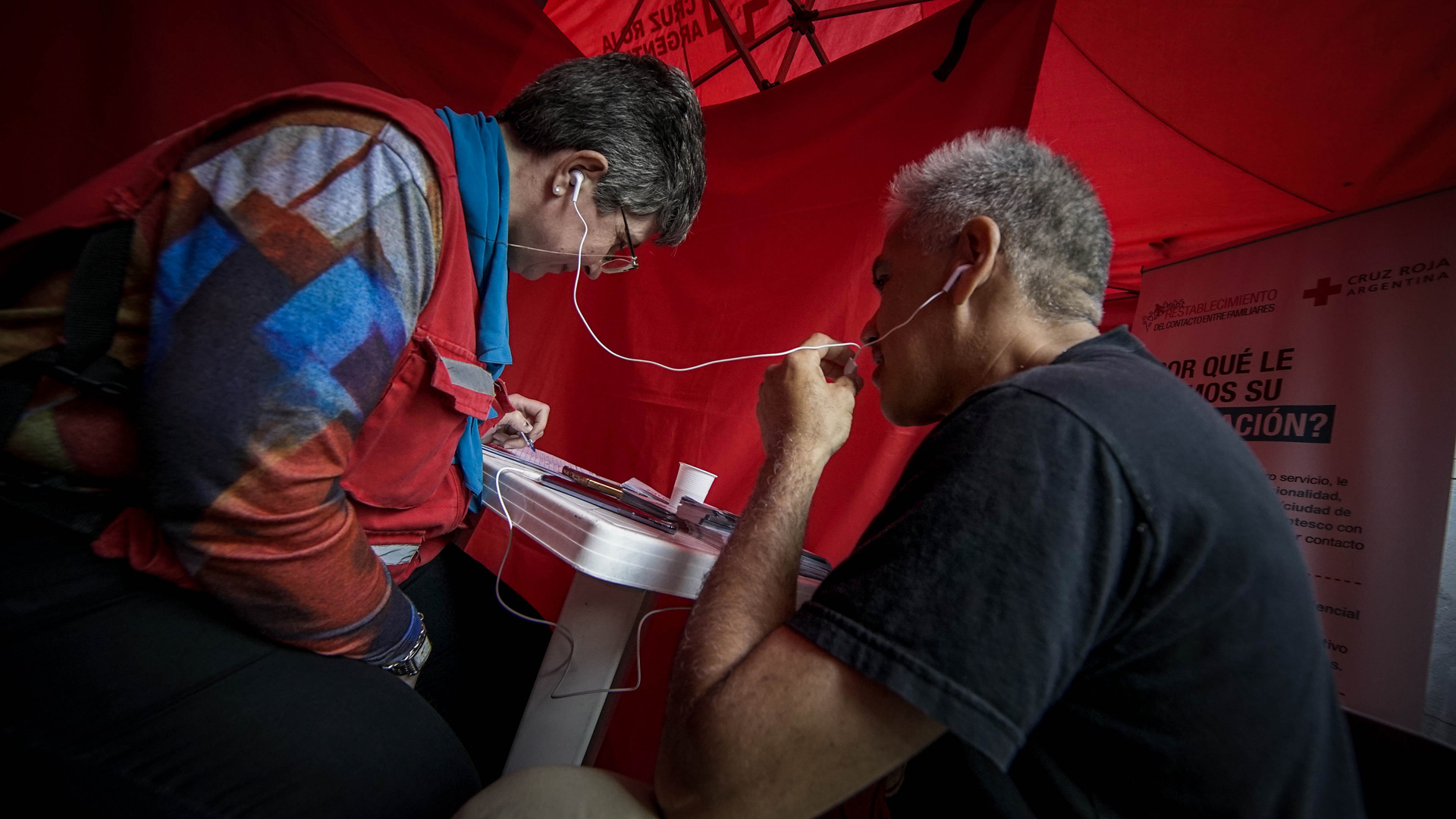HSP Case Study: Argentine Red Cross
Argentine Red Cross
Mobile Humanitarian Service Point
Argentina, province of Jujuy, on the border with Bolivia
2020
- Venezuelan refugees and migrants
- Other migrants and displaced persons in transit
- Healthcare (including first aid and mental health and psychosocial support)
- Social casework
- Food and water
- Hygiene kits
- Information provision
- Connectivity
- Safe referrals
Since 2014, the complex socio-economic situation in Venezuela has forced over 7 million Venezuelans to flee the country. Venezuelans continue to arrive in Argentina, despite a considerable reduction in numbers since 2021. By the end of 2022, Argentina’s population of Venezuelan refugees and migrants was estimated at 220,595 people. Other migrants and displaced persons from South America countries also move to Argentina in search of safety, jobs and better lives. For several years, considerable numbers of migrants and displaced persons from outside the Americas have also been settling in Argentina. From 2010 to 2020, migration to the Southern Cone (Argentina, Brazil, Chile, Paraguay and Uruguay) from Bangladesh, China, India, Japan and other Asian countries increased by almost 40 per cent. Since mid-2022, the Argentine Red Cross has noticed a reconfiguration of the dynamics of migration in Argentina, with the country fast evolving into a country of transit as well as destination.
Despite the prosperity enjoyed by most people in the Southern Cone, the high numbers of migrants and displaced persons arriving since 2014 has left host communities overwhelmed. National and local capacities have also reached their limits. Countries are under pressure to provide effective support and guidance, including legal services, adequate housing and shelter, healthcare, sanitation, labour opportunities, food, clothing and support with other basic needs. According to reports, Venezuelan refugees and migrants are at serious risk of exploitation and abuse (particularly gender-based violence, human trafficking and people smuggling) and family separation. Increasing levels of xenophobia also raise various issues around inclusion and integration. Migration from outside the Americas also represents a further humanitarian challenge, with African and Asian migrants and displaced persons facing heightened vulnerability due to their lack of regular migration status and knowledge of local languages and cultures.
In this context, key priorities are to provide health, food, water, sanitation, hygiene facilities, adequate housing, protection and social inclusion activities. In 2020, the Argentine National Directorate for Migration, Argentine Red Cross, International Organization for Migration, UN High Commissioner for Refugees and civil society organizations such as Comisión Argentina para Refugiados y Migrantes (CAREF) and Agencia Adventista de Desarrollo y Recursos Asistenciales (ADRA) gathered to discuss how best to alleviate human suffering along the migration route in northern Argentina. These discussions led to the ‘protection route’ being set up: an inter-agency response aimed at assisting all migrants and displaced persons entering Argentina through the northern border. As part of this initiative, different actors committed to provide services based on their areas of expertise, with the Argentine Red Cross proposing an offer composed of first aid, healthcare and psychosocial support.
There are now seven fixed and two mobile Argentine Red Cross HSPs, including the mobile HSP in the province of Jujuy. This HSP, which supports migrants and displaced persons in transit, was designed with support from the IFRC, including through the IFRC’s HSP digital toolkit. The National Society decided to implement a mobile HSP to respond to the needs of migrants and displaced persons throughout the province of Jujuy, on the border with Bolivia, as well as carry out sporadic interventions in the neighboring province of Salta. Humanitarian services are provided in a van that covers between 1200 and 1400 kilometers every week. It operates on the route from San Salvador de Jujuy to La Quiaca, the northernmost point of Argentina, providing services all the way to the international bridge crossing between La Quiaca and Villazón in Bolivia.
The van is equipped to function as a first aid station and connectivity point, carrying relevant medical equipment and an internet connection that allows people to notify loved ones that they have arrived in Argentina. It is also equipped with computers, infographics and information (including on relevant services in destination cities) to help migrants and displaced persons orient themselves to the context in Argentina. The van also distributes food rations and hygiene kits and works as a hydration point, distributing up to two liters of water per person.
"The sensitive and human aspects are things that are not quantified in this type of projects and evaluations, but they are very important. Being able to maintain contact with the people is very important to be able to guarantee access to rights for the population and to build trust with the population. Without that, our work would not be possible.”
Staff member, Argentine Red Cross
The HSP implements a protection, mental health and psychosocial support strategy for children, aiming to mitigate the impact of violence and discrimination suffered by children on the move. Using the strategy, the Argentine Red Cross focuses on delivering psychological first aid to children and making referrals, where needed, to partner organizations. Safe referral protocols, a referral toolbox and guidelines, were developed based on initial cooperation with partners during the route development.
The HSP pays particular attention to women, children and adolescents (accompanied and unaccompanied), persons with disabilities, older people and people at risk of statelessness. Even though the migrant and displaced population has diversified significantly in recent years, Venezuelans, for whom the project was initially created, remain the largest group receiving services.
The HSP is run by two professional staff, previously Argentine Red Cross volunteers. One specializes in first aid, nursing and healthcare, while the other oversees mental health and psychosocial support. According to Argentine Red Cross staff, part of the success of the Jujuy HSP stems from the articulation between healthcare and psychosocial support. Staff shared their view that, since 2020, a “network of trust between the Red Cross and the migrant population was created, that also allows the team to identify migratory flows beyond Bolivia.” For example, families transiting in Peru may contact the HSP to share details about their migratory journey in advance, or Venezuelans may reach out before they depart. These early contacts with migrants and displaced persons allow the Jujuy team to provide information aiming to reduce vulnerabilities, and better anticipate and understand the plans and needs among incoming people.
Argentine Red Cross staff reported that the trust binding the Argentine Red Cross to migrants and displaced persons is partly rooted in the Fundamental Principles of the International the Red Cross and Red Crescent Movement, in particular the principle of humanity, which promotes mutual understanding, friendship, cooperation and lasting peace among all peoples.
The HSP has become an integral part of the local humanitarian landscape in terms of emergency response and healthcare. Argentine Red Cross staff related that the HSP is recognized among partners as an essential resource that can be adapted to different situations and contexts. The Argentine Red Cross is now working to adapt its strategy in line with evolving needs. HSP staff believe that it is crucial for the Argentine Red Cross to continue implementing this service point, as an integral part of its migration strategy which “has so much resonance within the [Argentine Red Cross] itself”.
Red Cross and Red Crescent insights
“Migrants in irregular transit are exposed to many risks”
Argentine Red Cross staff member
Some of the most significant challenges the HSP team faces are the multifaceted risks and vulnerabilities that people travelling irregularly along migration routes experience. These include violence, human trafficking, exploitation as well as health-related risks such as dehydration. The HSP staff pointed to two elements perceived as crucial to reducing risks and meeting complex needs: providing information about the dangers and risks along migration routes and collaborating with government agencies to mitigate those risks.
“At times when we had no resources, everything fell to a migration team of just four people”
Argentine Red Cross staff member
Finding the human, financial and material resources to operate the HSP was a great challenge for the Argentine Red Cross. The HSP has become a genuine asset, valued by migrants and displaced persons, the Argentine Red Cross and partners alike. However, this is strongly underpinned by – and to some extent reliant on – continued external funding and support.



